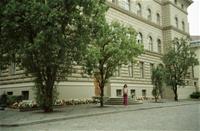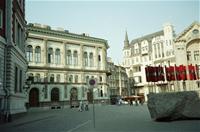The math of the parliamentary elections in Latvia
Imants Frederiks Ozols, October 6, 2010
 Only upon closer examination one might reveal that elections in Latvia, contrary to media reports, do not show overwhelming support for government’s tough decisions controlling the effects of the economic crisis in the country that is considered to be among the severest hit by it. But the world is right when it comes to estimating the high hopes Latvia’s voters have vested into the modern myth, the formula that equals toughest measures together with the bright future perspectives yet to follow.
Only upon closer examination one might reveal that elections in Latvia, contrary to media reports, do not show overwhelming support for government’s tough decisions controlling the effects of the economic crisis in the country that is considered to be among the severest hit by it. But the world is right when it comes to estimating the high hopes Latvia’s voters have vested into the modern myth, the formula that equals toughest measures together with the bright future perspectives yet to follow.
When one considers election results in other countries, nuances are excluded, simply because local peculiarities have little impact and the more you go into detail, the more questions arise. Instead, the whole election game and the outcome of it is defined in simple and on surface clear-cut terms ‘leftist, rightist, centre-right, centre-left, coalition, ruling party’, etc. In fact these are just designations that each time take rather different meaning depending on local peculiarities. And there have been a few in Latvia. Just as an illustration, remember that Russian speaking parties are considered more left-oriented, instead Latvian speaking ones – right and centrist.
But let’s go down to the basics of 2010 Parliamentary elections in Latvia: The  media claimed that since it was Prime Minister Mr Valdis Dombrovskis, under whom most of the tough measures to control the crisis were taken and since he was the symbol of the political alliance Unity that won the vote, then it means the country has voted for his economic policy. Another conclusion that comes out of it is that green light has been given to impose even more of the tough measures should a need arise. The conclusion, easily aired by foreign media and observers, is consistent but does it really explain the formula in question.
media claimed that since it was Prime Minister Mr Valdis Dombrovskis, under whom most of the tough measures to control the crisis were taken and since he was the symbol of the political alliance Unity that won the vote, then it means the country has voted for his economic policy. Another conclusion that comes out of it is that green light has been given to impose even more of the tough measures should a need arise. The conclusion, easily aired by foreign media and observers, is consistent but does it really explain the formula in question.
No. Instead there was a bouquet of reasons for the victory. Even though there is place for the claim above, the protest votes against Russia-linked political forces and against the political force running long-time political heavy-weights have to be included in the calculation. The phenomenon of the latest elections - should also be taken into an account - voting with an empty envelope. Though overlooked now by media reports (both foreign and home media alike), the latest elections ran a new trend (even advertised on radio, targeted towards younger audience) - vote with an empty envelope, i.e. - without a ballot in it. The vote is legitimate and thus counted, which, in turn, scores higher voting activity and this sets a minimum level in case popular vote is to be needed during the current Parliamentary period. And last but not least - no one has accounted for the Latvian citizens that have left the country to work abroad. Their number can only be estimated by guesswork, but any 10 thousand mean a lot, given that there are less than a million voters that took place at all.
 Semantics has to do with it
Semantics has to do with it
Each of the political forces listed for the elections came out with a message of their own. And the message of the political alliance of Prime Minister was short and straightforward – stability. The single word appears to have a magical appeal right now in Latvia. Most probably the expectations are unjustly high to see the state economics take a sharp turn uphill. If comments by economic experts, political experts and government are summed up, then the overall message is that Latvia is heading just in the right direction and shall the current trends pertain, the perspectives will be bright. For a common voter that means somewhat of a promise of times they had yet 2 years ago.
‘Stability’ is semantically a heavily loaded word in Latvia now. It implies predictability, foreign support, return of interest of foreign investors, no further cuts on welfare and so on. Stability was the main message by the Unity political alliance and the head of government was the human face for this claim. In other words disillusionment might be closer than it seems from the neutral point of view of an outsider.
Going behind the scene
The 2010 elections have been marked by party alliances rather than single  parties. And especially when it comes to the PM's party or rather the alliance represented by the Premier of Latvia at the time of elections Mr Valdis Dombrovskis, the party union “Vienotiba” (Unity) is not exactly a monolith foundation. It is rather a constellation of at least three solar systems, each having its own sun. The pre-election period for the party union has not been an easy one - not only it had to fight back political rivals, it appeared to be tempted to let cracks on its own walls and foundations as well. Nevertheless the central message of the party union prevailed - PM Mr Valdis Dombrovskis is the only guarantee for stability. I believe this is what people voted for, when they decided for the Unity union.
parties. And especially when it comes to the PM's party or rather the alliance represented by the Premier of Latvia at the time of elections Mr Valdis Dombrovskis, the party union “Vienotiba” (Unity) is not exactly a monolith foundation. It is rather a constellation of at least three solar systems, each having its own sun. The pre-election period for the party union has not been an easy one - not only it had to fight back political rivals, it appeared to be tempted to let cracks on its own walls and foundations as well. Nevertheless the central message of the party union prevailed - PM Mr Valdis Dombrovskis is the only guarantee for stability. I believe this is what people voted for, when they decided for the Unity union.
One can only wonder what the outcome would have been had not the parties ventured for a simple math - coming together for political unions, showing off their best selling faces to the public and promising stability as exampled by the Premier himself - his stance, attitude and yet surprisingly composed nature in public. No need to go into much detail about other political alliances that won seats in Parliament. It’s suffice to mention the “Saskaņas centrs” (somewhat lamely translated into English as “Harmony Centre”) that at the level of political rhetoric at least is linked to Kremlin and Russia’s political and economic interests in Latvia.
 Even despite the big difference between the winners of the race they nevertheless came second in number of votes. It both shows widespread sympathy towards their ambitions to come up with their own recipe for the crisis management of Latvia’s economy (and they somewhat appeared to favour a different attitude towards international donors from that taken by ruling coalition). The later union of Harmony Centre is Russian dominated political force. Though the ethnicity of parties is becoming less of the issue, it still plays some role. Fear of Kremlin’s impact is also present yet. This, most probably gave additional supporters to the Unity union, even if economic agenda of Harmony Centre seemed more and more lucrative to many.
Even despite the big difference between the winners of the race they nevertheless came second in number of votes. It both shows widespread sympathy towards their ambitions to come up with their own recipe for the crisis management of Latvia’s economy (and they somewhat appeared to favour a different attitude towards international donors from that taken by ruling coalition). The later union of Harmony Centre is Russian dominated political force. Though the ethnicity of parties is becoming less of the issue, it still plays some role. Fear of Kremlin’s impact is also present yet. This, most probably gave additional supporters to the Unity union, even if economic agenda of Harmony Centre seemed more and more lucrative to many.
And the last worth mentioning is a political unity formed by two political heavy-weights in Latvia, the former minister of transportation Mr Ainārs Šlesers and a former Prime Minister of the country and a long-time head of the People’s party Mr Andris Šķēle. The desperate campaign gave them 8 seats in Parliament and even that is much for the tandem that has the heavy history they do. Again, there seems to be enough grounds to speculate the history of the two might be dim enough to redirect voters to the Unity alliance.
What comes next?
You are bound to have a hangover after celebration of the election night, when the  political parties and their alliances come together to celebrate their success (well, for some it was a failure, too, but history is written by heroes, so let’s concentrate on them). Arguably this hangover is a bit stronger that was expected. The parties and political alliances already in the first days after the election ran into the first problems of forming a coalition. Certainly there is much of play involved to clear the way for political or economic demands and go on with talks, but even then some problems can be anticipated already as well as an attitude for more severe cuts of public spending - the course demanded and readily taken by the active government of Latvia - is among the most prominent ones. In other words - what brought to power can soon strip-off it.
political parties and their alliances come together to celebrate their success (well, for some it was a failure, too, but history is written by heroes, so let’s concentrate on them). Arguably this hangover is a bit stronger that was expected. The parties and political alliances already in the first days after the election ran into the first problems of forming a coalition. Certainly there is much of play involved to clear the way for political or economic demands and go on with talks, but even then some problems can be anticipated already as well as an attitude for more severe cuts of public spending - the course demanded and readily taken by the active government of Latvia - is among the most prominent ones. In other words - what brought to power can soon strip-off it.
*Imants Frederiks Ozols, Mg.Philol, a semiotician